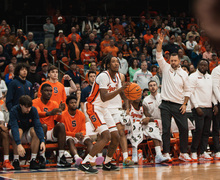Breaking down how investigators used computer data to uncover improper academic benefits at Syracuse
In uncovering instances of improper academic benefits at Syracuse University, investigators used metadata to track emails from student-athletes and athletics staff members.
Throughout the NCAA’s report on SU, the document notes that members of the athletic department wrote or revised the work of student-athletes.
While interviews and testimony at the NCAA Committee on Infractions Hearing in October 2014 played a role in the investigation, so too did metadata, which School of Information Studies professor Jian Qin said is essentially “data about data.” Information is embedded in an email the moment it’s sent, including the time stamp, which server the email was initiated from and where the email was transferred to, Qin said. Metadata can also be used to learn more about computer files.
“This metadata is necessary because it tells the network where to send this information, but this kind of information also becomes public once the email is generated,” she said. “Metadata is extremely important in email tracking and digital forensics.”
According to the report, emails were often exchanged between student-athletes, athletics staff members and student-athlete support services employees. Metadata allowed investigators to view the author of emails and coursework attached to those emails, as well as who the documents were last edited by.
In multiple cases, the use of metadata revealed that the assignments had been altered or created on a network account belonging to someone other than a student-athlete.
For example, the report details the case of “student-athlete 8,” who had a five-page paper due that required at least five peer-reviewed scholarly papers and a bibliography.
An investigation found that two versions of that paper existed.
One, a four-page paper, was saved on student-athlete 8’s network user profile. The other, a six-page paper that included scholarly articles and a bibliography, was saved under the name of the support services mentor and on the same type of computer she had at home, according to the report. The Post-Standard has identified Debora Belanger as the support services mentor.
The support services mentor emailed student-athlete 8 a copy of the second, longer paper. The student-athlete’s email account then forwarded the paper to the director of basketball operations. The student-athlete ultimately received a “B” in the course, according to the NCAA report.
In another instance, metadata analysis showed that student-athlete 8 received assistance on a presentation assignment. The first version of a presentation outline file was saved to the student-athlete’s network. A second, substantially revised version was saved under the support services mentor’s user ID, according to the report.
The report further details that the support services mentor emailed the presentation and script to the director of basketball operations asking him to print it for the student-athlete to take. Student-athlete 8 presented and received a “C” in the course, according to the report.
In regards to a different student-athlete, identified in the report as “student-athlete 9,” metadata was used to uncover that multiple versions of a midterm document was saved to the student-athlete’s user profile.
Over a month later, student-athlete 9 met with the support services mentor for a two and a half hour tutoring session. The report reads that three items were saved to the student-athlete’s profile during the session — a final exam, an expanded midterm consisting of 25 definitions and one essay.
Only one of those items, the essay, was opened for editing during the tutoring session, according to the report.
The metadata on the three files showed that at some point, the documents were housed on the same type of device the support services mentor used at home. In addition, the name appearing in the “author” field differed from the vast majority of student-athlete 9’s other documents.
Qin, the iSchool professor, said it’s a misconception to think that information attached to email and documents will remain private. In reality, data is attached to each email that can be used to track where it originated.
Particularly in today’s technological environment, she said, it’s difficult to keep things private.
“Metadata can tell people a lot of things about what you did and can be used as evidence against you,” Qin said. “So really people need to be doing the right thing, not thinking, ‘Oh, nobody will detect this or find this.’ It’s almost impossible.”
Published on March 8, 2015 at 10:46 pm
Contact Brett: blsamuel@syr.edu | @Brett_Samuels27





